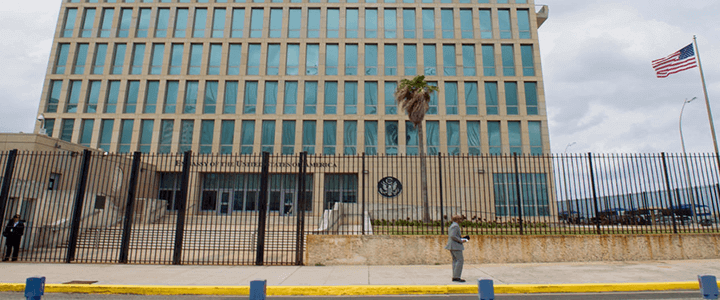The U.S. embassy in Havana, Cuba is closing again, because of something straight out of a Robert Ludlum novel. Well, not closing exactly, but sources are telling reporters that the State Department will withdraw all non-essential personnel and all families from Havana two months after it was revealed that several diplomats became ill when they were attacked with what has been called a “sonic weapon.” This weapon, which the U.S. government has refused to elaborate on, is some sort of device that produced sounds too low to be heard, but which cause dizziness, nausea, and in at least a few cases, traumatic brain injury.
TBI… from sound waves.
cuban foreign minister denies involvement
When President Obama announced in December 2014 that the U.S. would reopen the embassy, there were many who believed it was an ill-advised move, a move that rewarded a government that hadn’t yet demonstrated it was worthy of diplomatic recognition. Those same people believe these sonic attacks are merely more evidence of that.
The U.S. has been publicly weighing the move for about a week and a half. To be fair, the Cuban government strenuously denies involvement, and most of the reporting indicates that the Trump administration agrees that they are not. Trump has signaled that he wants to reimpose stronger sanctions, so Cuban attacks on our embassy staff doesn’t make much sense.
The Cuban foreign minister, Bruno Rodriguez, told the U.S. last week that “Cuba has never perpetrated nor will it ever perpetrate actions of this sort. Cuba has never allowed nor will it ever allow its territory to be used by third parties with that purpose.” According to the Washington Post, Rodriguez met with Secretary of State Rex Tillerson in Washington Tuesday to plead with him. He was not successful.
Analysts believe the Russians may be behind these attacks. Perhaps they fear a loss of influence in Cuba and are determined to poison the well. The attacks date back to 2016, so it’s not related specifically to President Trump. The situation has State Department investigators baffled.
a long, strained history
Relations between Cuba and the U.S. have been strained ever since Fidel Castro came to power in 1959. After the Castro regime turned to the Soviet Union for support, President Eisenhower imposed the first trade embargo in 1960, and the embassy closed in 1961. The U.S. backed an spectacularly unsuccessful invasion by Cuban exile militia Brigade 2506 at the Bay of Pigs in April 1961, and the 1962 Cuban Missile Crisis, in which the Soviets deployed nuclear-armed intermediate-range missiles to the island, sealed the deal.
Wave after wave of Cuban refugees have crossed the shark-infested Florida Straits to seek asylum in America. An entire generation of Cuban-Americans (my classmates at the University of Miami in the 1980s) grew up in the U.S., primarily in Miami-Dade County, Fla., dreaming of a Cuba free from communist oppression, fed by the stories of their parents who fled the Castros over the years. The U.S. embargo had largely become a symbolic gesture, since almost no other country was participating, but it kept the exiles hopeful.
They strongly opposed Obama’s moves to normalize relations, a move that may have contributed to Trump carrying Florida in 2016. About 54 percent of Cubans voted for Trump, versus 29 percent of the Latino population overall.
If Cuba is serious about improving relations with the United States, it must do everything in its power to figure out who is behind these attacks and punish them appropriately. But I wouldn’t hold my breath waiting for the Cubans to bite the Russian hand that still feeds them.



